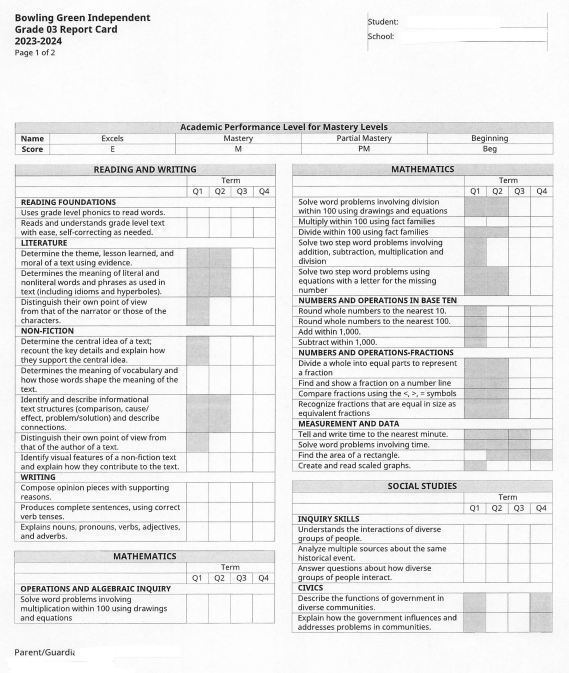BGISD adopts new grading system for 3rd through 5th
Published 8:00 am Saturday, August 12, 2023

- A sample report card for a third grade student distributed by BGISD. Additional samples for other grades can be found on the district's "Standards Based Reporting" webpage. Provided by BGISD
Bowling Green Independent School District announced this week that third- through fifth-graders will switch to standards-based grading this year.
Unlike traditional grades that utilize an A to F scale with corresponding percentages, standards-based reports give feedback on specific skills and use labels like beginner, approaching mastery, mastery or excels.
Trending
Elisa Brown, director of instructional programs, said the primary goal of the change is to better communicate strengths and weaknesses of students and encourage teachers to stick to uniform methods of evaluation.
“We’re shifting (away) from earning arbitrary points that had a lot of convoluted pieces to it, and was graded differently from one teacher to another,” Brown said. “We all had the moment where we’ve had to learn that this teacher wants me to turn in assignments this way, but (another teacher) wants it this way.”
Sample report cards published by the district show skills categorized by subject. Fourth-graders, for example, will no longer receive an overall grade for a reading assignment; Rather, they are evaluated on their individual ability to analyze themes and describe story elements.
Standards-based grading has already been used in Bowling Green from kindergarten through second grade for at least 20 years, Brown said. Students impacted by the change will recognize the system from their time in primary grade levels.
While researching other schools across the state, Brown found that more high schools actually utilize the system than elementary schools. She said the district plans to expand the system up to junior high school but is still discussing how to go about it.
A major benefit of the system, Brown said, is it allows for more multifaceted assignments that touch on a variety of skills.
Trending
An essay, for example, could show a student has mastered their grammar and word use, but needs improvement in organizing and presenting an argument. Their report card would reflect each skill separately.
In contrast, that same student under traditional grading may outright fail the assignment if their organization was below standard. They may also struggle afterward to make up for lost points.
Superintendent Gary Fields and Brown are both hopeful the change will help refine the work students are given, cutting down on “busy work” that Brown said can leave students “defeated.”
“I had a teacher tell me today, ‘homework either needs to be high quality, or you don’t need to do it at all,’ “ Brown said. “You should be reading a few things to practice, but it shouldn’t be ‘do all the odd numbers until 100.’ What does that really tell you?”
An announcement sent to parents Thursday emphasized the change focuses on tangible learning, not on achieving a grade and moving on. Issues regarding behavior and social skills, such as turning in work on time, will be evaluated separately from assignments themselves.
“Learning is individual, so there is no penalty for retakes,” the overview states. “The consequence of not completing an assignment on time? Completing the assignment at a different time.”
The announcement to parents also stated the traditional system can be inconsistent. Not all teachers offer extra credit, for example, or account for time, legibility and effort in assignments – factors that could tip the balance of a student’s grade.
Starting around 2019, Brown and members of the administration identified a need for better collaboration between teachers at different schools, though COVID-19 pushed many plans back.
Fields said the district now has “Communities of Practice,” wherein teachers from each school meet within their grade levels to discuss shared standards and methods.
“It’s not just one school making a decision. It’s all five schools and the teachers making the decision,” Fields said.
Brown said school principals have been eager to move forward with the new system and teachers have been given resources on how to go about evaluating students. They’ve also asked teachers to share standards with parents and answer questions they may have.
There may be some things that need tweaking along the way, Brown said, but “nothing is ever a final draft” from her perspective. Standards are regularly revisited and refined, even as recently as this year.
“(The principals) believe, even though it’s a change and an adjustment – especially during this first nine weeks – that by the second nine weeks, families will appreciate this more because of the communication,” Brown said.







